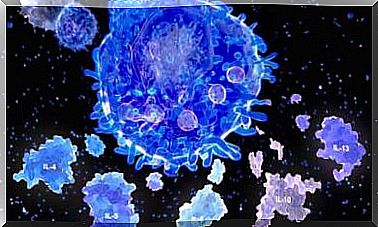What Are The Types Of Side Effects Of Drugs?
Adverse drug reactions can be predictable or unpredictable. It is important that we check with healthcare professionals before taking any medication.

They are sure you have heard of unwanted or side effects of medications. 7% of the population has some kind of adverse drug reaction, which is a public health problem.
An adverse drug reaction is any reaction to a drug that is harmful or unintentional. This reaction develops at doses normally applied. These may be doses intended for the prophylaxis, diagnosis or treatment of the disease, as well as for the restoration, correction or modification of biological functions.
Some of the drugs that most often produce side effects include:
- Nonsteroidal anti-inflammatory drugs
- Antibiotics
How to know the possible side effects of a drug?
The Spanish Agency for Medicines and Health Products (AEMPS) reminds us of the importance of always being informed about the medicines that have been indicated to us or those that we buy freely in pharmacies. It is essential to ask our doctor and pharmacist about the possible side effects that the medicine can cause. But also on situations in which its use is contraindicated.
In addition, you should also consult the package leaflet of the drug. It will contain a list of its known harmful effects and what to do if they occur.
All medicines on the market can cause an unwanted effect. However, it is decided to market them when their benefits outweigh their health risks.

Type of side effects
A general classification of adverse drug reactions groups them into two broad groups. On the one hand, predictable reactions, on the other, unpredictable reactions.
Predictable reactions
They represent 80% of the negative effects. Usually they are dose dependent. This means that the higher the dose, the more side effects of these medicines. In addition, they are related to the pharmacological actions of the drug, such as:
- Side effect of its mechanism of action
- Interaction with another drug or substance
- Overdose
Unpredictable reactions
These reactions, different from the previous ones, are not dose dependent, so they can develop in any amount. They are also unrelated to the pharmacological actions of the drug. These reactions are linked to factors depending on the patient. This is the case, for example, in people with immune sensitivity or susceptibility due to genetic differences.
Among the unpredictable side effects we can distinguish the following:
- Intolerance : when at minimal doses we are not able to tolerate the drug. For example, some patients experience tremors at lower doses of salbutamol
- Idiosyncrasies : These are genetically determined reactions that consist of an abnormal response to the drug, because the patient has an enzyme deficiency or abnormalities in the metabolism of the drug. These reactions are usually more serious, but they occur in a small number of people.
- Hypersensitivity reactions or allergic reactions : these are abnormal responses caused by an immune mechanism. For example, penicillin allergy
- Pseudo-allergic or anaphylactoid reactions : these are clinically indistinguishable from the reactions above. However, they occur by a different mechanism, in which the immune system is not involved. They have been described with opiate drugs, among others
Other types of adverse drug reactions

In addition to those mentioned, there are also other side effects that can occur in pharmacological treatment. Some of these other reactions are known as type C.
They appear after prolonged administration of a drug and are generally predictable and known. This group includes drug addiction – as can occur with benzodiazepines -, tardive dyskinesia due to neuroleptics, or Cushing’s syndrome due to steroids.
Type D reactions are rare and appear some time after the end of treatment. Some of these reactions are teratogenesis, which is a malformation of the fetus, and carcinogenesis.
On the other hand, there are type E reactions. These are those which occur after the very abrupt withdrawal of a drug. An example of this type of side effect is adrenal insufficiency after stopping steroids, seizures after stopping antiepileptics, or angina after stopping beta blockers.
Conclusion
It is very important that we have all the necessary information about the medicines we are going to take, because any that are available can trigger an adverse reaction which may develop into a dangerous reaction. We recommend that you always ask your doctor and pharmacist for instructions on how to use the medicine, as well as any contraindications.









